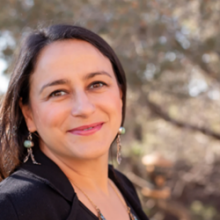1. In a few sentences, what is your role at the agency you work for?
My role at the New Mexico Early Childhood Education and Care Department has focused on supporting projects for the Early Childhood Comprehensive Systems Health Integration Prenatal-to-Three (ECCS) program, funded by the Health Resources and Services Administration, Maternal and Child Health Bureau. The goal of this program is to help states support alignment and coordination of care systems related to maternal health and early childhood. As a policy fellow, I have supported a variety of projects within the ECCS initiative, including leading a project to better understand the landscape of developmental screening efforts in New Mexico. For this project, I collected data using semi-structured interviews from key New Mexico stakeholders about the coordination of efforts in administration of developmental screening, data storage and referrals to early childhood intervention services. I also researched approaches and models utilized in other states specific to data screening efforts. Additionally, I provide support for a healthcare marketing project that aims to increase referrals to home visiting and early intervention programs in New Mexico.
2. What interested you in becoming an SRCD Policy Fellow?
Through my work as an assistant professor, I have had the opportunity to conduct community-partnered research with rural and tribal communities of New Mexico. This work highlighted for me the importance of partnering with communities to understand community-specific needs and concerns related to early childhood development, and to tailor my research and utilize data to better serve local communities. The ECECD has a deep commitment to improving cross-agency collaborations including strengthening partnerships with local communities and families. Thus, my motivation to become a SRCD fellow was to further develop skills that would help me interact with community organizations, state-level agencies, legislators, and policymakers to be able to conduct policy-relevant research that is aligned with the needs of communities and legislative priorities.
3. What has been the most memorable project you have completed during your time at the agency?
One of the projects that I have worked on during my time at the agency is the developmental screening project that aims to gain a comprehensive understanding of developmental screening efforts and stakeholders in New Mexico with the hope to utilize this information to inform how NM can enhance developmental screening administration and increase referrals to early intervention services. This project included two parts. The first part included an assessment plan to interview stakeholders within the state of New Mexico to better understand their process in administration and referral to services. The second part of project was researching successful models/programs from other U.S. states that focused on improving screening administration and referral to early intervention services.
A summary of information obtained from both sections will be presented at the ACT Early Regional Summits in June and July 2024, organized by the Center for Development and Disability (CDD). This information, coupled with feedback from regional partners, will guide the planning of next steps to align and streamline developmental screening administration and referral efforts in New Mexico.
4. What words of wisdom might you pass on to someone who is interested in SRCD’s fellowship program?
The best advice I received from previous fellows when starting the fellowship program was to be flexible in taking on projects rather than being attached to pre-defined topics that I had in mind or hoped to be part of. Working at the state agency is very different from working in an academic setting. There are multiple influences from various sources including voices from the community members, priorities set by legislative sessions, and changes in leadership, that can change the direction of a project. Being flexible to adapt to new demands and trusting the process was the best advice that was given to me, which I would like to pass on to the incoming fellows.
5. What has been your favorite aspect of SRCD’s fellowship? Please explain why.
Working more directly and networking with people from various sectors including state agencies, service providers, families and community members, and technical assistance programs have been the most enjoyable experience for me during this fellowship. Through this experience, I have developed a very deep appreciation for the shared leadership and the importance of cross agency collaborations to leverage on various expertise and skills that people from different sectors, agencies and entities bring to a project to make it successful. I have learned so much from each person who I have encountered through this journey, which has underscored for me the importance of having a lifelong learning approach and to trust the power of collaboration for successful team building.
6. What is your favorite book?
Crime and Punishment by Fyodor Dostoevsky is one of my favorite novels of all time. Dostoevsky is the master of analyzing human psychology and behaviors. His meticulous analysis of the main characters in this book is the reminder of why we need to have an empathic and trauma-informed lens in judging human behaviors and their underlying motivations, and how the lines between evil and good sometimes can be blurry.
